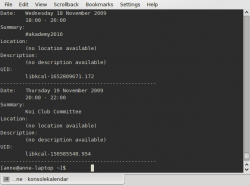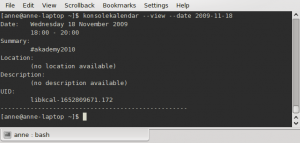KonsoleKalendar: Difference between revisions
m Add Language Bar Template, simplify English |
Extended how-to-use entries |
||
| Line 1: | Line 1: | ||
{{Template:I18n/Language Navigation Bar|KonsoleKalendar}} | {{Template:I18n/Language Navigation Bar|KonsoleKalendar}} | ||
konsolekalendar is an application to administer a calendar without a graphical user interface. konsolekalendar's syntax must be learned first. | {|style="text-align:center" cellpadding="2" | ||
|[[Image:Konsolekalendar-view.png|250px|thumb]]||'''Use your calendar when you can't us a graphical user interface''' | |||
|} | |||
konsolekalendar is an application to administer a calendar without a graphical user interface. It normally works with the calendar that is marked Default, if you use KOrganizer. However, it is possible to create a calendar if you don't have one already. | |||
As it is strictly a command-line application, konsolekalendar's syntax must be learned first. | |||
Here is a short introduction to using konsolekalendar. | Here is a short introduction to using konsolekalendar. | ||
* If you do not already have a calendar set up, you first need to create one | |||
konsolekalendar --create --file ~/.kde/share/apps/korganizer/vacation.ics | |||
(This location will enable it to be used either in konsolekalendar or in korganizer.) | |||
* Add a calendar entry | * Add a calendar entry | ||
konsolekalendar --add --summary | konsolekalendar --add --date 2009-06-06 --summary "My Birthday" \ | ||
--description "Party Time" | |||
adds your birthday to your default calendar. | |||
* Add a vacation | |||
konsolekalendar --add --file vacation.ics --date 2009-08-01 \ | |||
--end-date 2009-08-07 --summary "Vacation" --description "Nobody will ever find me!" | |||
* Show all calendar entries | * Show all calendar entries | ||
konsolekalendar --all 2>errorlog | konsolekalendar --all 2>errorlog | ||
You probably don't want to do this, if you have been using your calendar for long. However, you can specify date ranges: | |||
konsolekalendar --view --date 2009-08-17 --end-date 2009-08-21 | |||
shows that particular work-week. | |||
* Maybe you only wanted to see the next entry? | |||
konsolekalendar --next | |||
* Or for the week ahead? | |||
konsolekalendar --show-next 7 | |||
* Show your calendar file | * Show your calendar file | ||
konsolekalendar --view 2>&1 | grep resource | grep konsolekalendar | konsolekalendar --view 2>&1 | grep resource | grep konsolekalendar | ||
* Edit an entry | |||
konsolekalendar --change --uid libkcal-1652809671.172 --summary "Get my head examined" --description "I must be crazy!!" | |||
* Before you can delete an entry, you first need to list it: | |||
{|cellpadding="2" align="center" | |||
|[[Image:Konsolekalendar-list.png|300px]] | |||
|} | |||
There at the bottom is the UID of the entry. | |||
Now you are ready to delete it - | |||
konsolekalendar --delete --uid libkcal-1652809671.172 | |||
::{|cellpadding="5" | |||
|[[Image:dialog-warning.png|32px]]||'''Warning'''||Beware - this is a permanent delete. You cannot recover the entry | |||
|} | |||
* Export a calendar | |||
It is possible to export to several formats, including CSV and html. | |||
konsolekalendar --export-type CVS current.ics | |||
* Import a calendar | |||
konsolekalendar --import another.ics --file current.ics | |||
In this case, all the entries from another.ics will be merged into current.ics. | |||
Revision as of 19:43, 15 November 2009
Template:I18n/Language Navigation Bar
 |
Use your calendar when you can't us a graphical user interface |
konsolekalendar is an application to administer a calendar without a graphical user interface. It normally works with the calendar that is marked Default, if you use KOrganizer. However, it is possible to create a calendar if you don't have one already.
As it is strictly a command-line application, konsolekalendar's syntax must be learned first.
Here is a short introduction to using konsolekalendar.
- If you do not already have a calendar set up, you first need to create one
konsolekalendar --create --file ~/.kde/share/apps/korganizer/vacation.ics
(This location will enable it to be used either in konsolekalendar or in korganizer.)
- Add a calendar entry
konsolekalendar --add --date 2009-06-06 --summary "My Birthday" \
--description "Party Time" adds your birthday to your default calendar.
- Add a vacation
konsolekalendar --add --file vacation.ics --date 2009-08-01 \
--end-date 2009-08-07 --summary "Vacation" --description "Nobody will ever find me!"
- Show all calendar entries
konsolekalendar --all 2>errorlog
You probably don't want to do this, if you have been using your calendar for long. However, you can specify date ranges:
konsolekalendar --view --date 2009-08-17 --end-date 2009-08-21
shows that particular work-week.
- Maybe you only wanted to see the next entry?
konsolekalendar --next
- Or for the week ahead?
konsolekalendar --show-next 7
- Show your calendar file
konsolekalendar --view 2>&1 | grep resource | grep konsolekalendar
- Edit an entry
konsolekalendar --change --uid libkcal-1652809671.172 --summary "Get my head examined" --description "I must be crazy!!"
- Before you can delete an entry, you first need to list it:

|
There at the bottom is the UID of the entry.
Now you are ready to delete it -
konsolekalendar --delete --uid libkcal-1652809671.172
- Export a calendar
It is possible to export to several formats, including CSV and html.
konsolekalendar --export-type CVS current.ics
- Import a calendar
konsolekalendar --import another.ics --file current.ics
In this case, all the entries from another.ics will be merged into current.ics.
